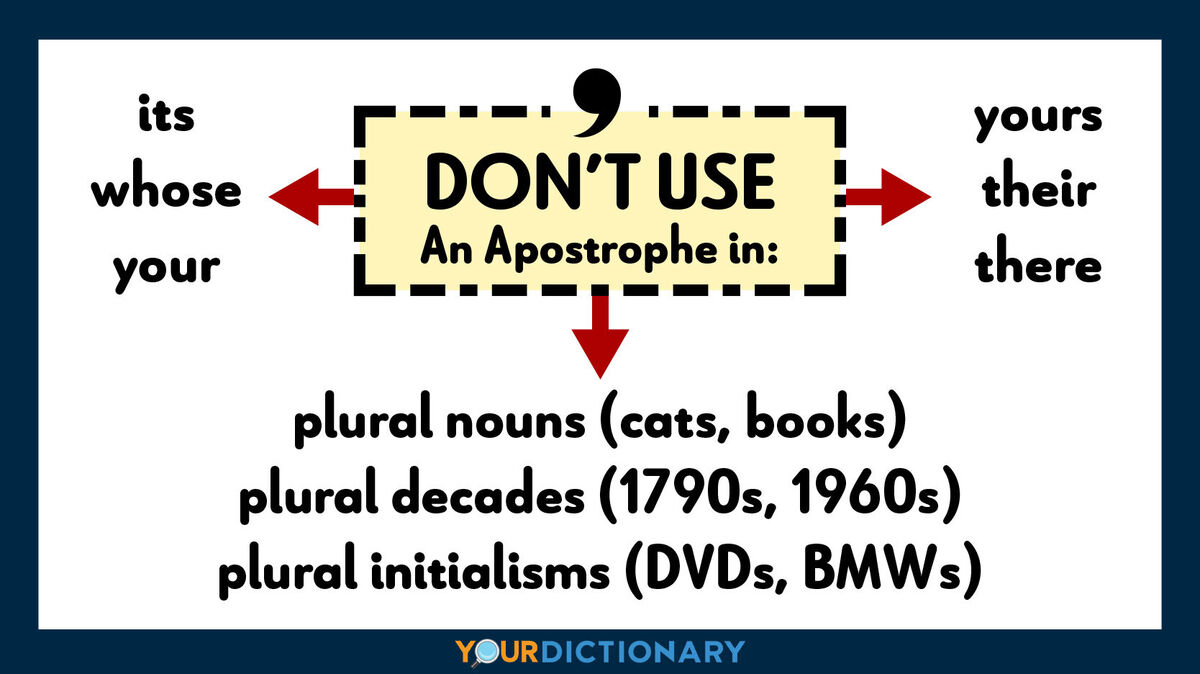
For such a small punctuation mark, the apostrophe causes some big grammar problems. You probably know when you need to use an apostrophe, but can you determine when an apostrophe is actually a grammar error? Keep reading for tips on when not to use an apostrophe to avoid common writing mistakes.
Don't Use an Apostrophe in Its
Contractions tighten up two words into one, making both writing and conversation smoother. While apostrophe skills aren't as necessary in spoken language, they're quite important in writing. Take the case of it's vs. its, for example:
- its - possessive pronoun (The dog closed its eyes.)
- it's - contraction meaning "it is" (It's my responsibility.)
Any time you have "it's" or "its" in your writing, double-check the sentence. If you can say "it is" in its place, then you do need the apostrophe. Don't use an apostrophe unless you mean "it is."
Don't Use an Apostrophe in Whose
There's no apostrophe in the relative pronoun "whose." Writers may confuse it for the word's homophone, "who's," but they are quite different words:
- whose - relative pronoun to ask about ownership (Whose sock is this?)
- who's - contraction meaning "who is" (Who's going to the party?)
If you can use "who is" instead of "who's" in the sentence, the apostrophe stays. If you're trying to ask about a noun with unknown ownership, keep the apostrophe out.
Don't Use an Apostrophe in Your or Yours
These apostrophe mistakes make every editor, professor and book aficionado cringe. Many writers mix up "your" and "you're," which are also homophones, as well as "yours." But their word meanings are different, and there's only one apostrophe between them:
- your - possessive determiner meaning "belonging to you" (I love your dress.)
- you're - contraction meaning "you are" (You're beautiful.)
- yours - possessive pronoun meaning "belonging to you" (The job is yours.)
Replace the word with "you are" if you're unsure. Keep the apostrophe if it works; lose the apostrophe if you're showing possession (your dog, your dress).
Don't Use an Apostrophe in There or Their
Remembering that apostrophes mainly like to hang out with contractions, there's only one time an apostrophe enters into the there, their, they're family of homophones. Don't use an apostrophe in the other two:
- there - adverb or pronoun meaning "that place" (I used to live there.)
- their - possessive determiner meaning "belonging to them" (That's their car.)
- they're - contraction meaning "they are" (They're so nice to me.)
If you're talking about something in a certain place (there) or something that belongs to people (their) you do not need to use an apostrophe. Only add the apostrophe if you can replace the word with "they are."
Don't Use an Apostrophe in Plural Nouns
Have you ever received a card from "the Smith's" or "the Wallace's" around the holidays? Mistakingly adding an apostrophe in plural nouns is a common holiday grammar mistake, mostly because the rules for plurals, possessives and plural possessives are difficult to remember. But unless you're talking about a noun that belongs to another noun, there is no apostrophe in plural nouns.
The rules for plural nouns, possessive nouns and plural possessive nouns are:
- plural nouns - add -s or -es, no apostrophe ("the Smiths" or "the Wallaces")
- possessive nouns - add an apostrophe and "s" ("Mr. Smith's dog" or "Mrs. Wallace's house")
- plural possessive nouns - add an "s" and an apostrophe ("the Smiths' dog" or "the Wallaces' house")
Remember, no possession, no apostrophe. If you'd prefer, you can add only an apostrophe to singular possessives that end in "s" already, such as "Carlos' dog" or "Socrates' lesson." But this decision depends on your writing preference and your style guide.
Don't Use an Apostrophe in Plural Decades
Do you use an apostrophe or not when writing "1930s" (or should it be "1930's")? Decades are nouns, and they follow the same rules as other nouns. Rules for using apostrophes with decades are:
- decades as nouns - add "s," no apostrophe (I wish I lived in the 1920s.)
- a single year as a possessive noun - add an apostrophe and "s" (1924's music is my favorite from that era.)
- abbreviations for decades - add an apostrophe before the contraction (The '20s was an interesting period for literature.)
If you're talking about a span of time that covers a historical decade, don't use the apostrophe. But if something belongs to one year of that decade, or if you're abbreviating the decade, you do need to include an apostrophe.
Don't Use an Apostrophe in Plural Initialisms
Have you ever written something like "ABCs" and wondered if it's wrong? It's not — but there are grammar rules that can confuse the matter. The rules are:
- plural initialisms or acronyms - add "s," no apostrophe (She owns two BMWs.)
- plural initialisms with one letter - add an apostrophe and "s" (I earned two B's and four C's this year.)
Technically, you can leave the apostrophe out of single-letter initialisms if it doesn't confuse your meaning (for example, "This sentence has too many I's" requires an apostrophe to keep "I's" from looking like "is"). But never add an apostrophe to multi-letter initialisms such as DVDs, RNs or FAQs.
Possess Apostrophe Power
Now that you know when not to use an apostrophe, this big grammar issue should seem as small as the tiny punctuation mark itself. If you remember to only use apostrophes when you're using contractions and noun possessions, you'll avoid many common grammar errors. Refresh your knowledge on using contractions correctly for more help on those shortened words and don't forget to post a comment or question about using apostrophes below.